Kuroneko Blu-ray Movie
HomeKuroneko Blu-ray Movie 
藪の中の黒猫 / Yabu no naka no kuronekoCriterion | 1968 | 100 min | Not rated | Oct 18, 2011
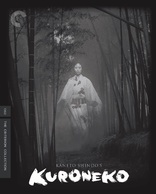
Movie rating
7.7 | / 10 |
Blu-ray rating
| Users | 0.0 | |
| Reviewer | 4.0 | |
| Overall | 4.0 |
Overview
Kuroneko (1968)
In medieval Japan, a military hero is sent to battle a strange apparition that has been killing samurai.
Starring: Kichiemon Nakamura, Nobuko Otowa, Kiwako Taichi, Kei Satō, Hideo KanzeDirector: Kaneto Shindō
| Foreign | Uncertain |
| Drama | Uncertain |
| Horror | Uncertain |
| Supernatural | Uncertain |
Specifications
Video
Video codec: MPEG-4 AVC
Video resolution: 1080p
Aspect ratio: 2.35:1
Original aspect ratio: 2.35:1
Audio
Japanese: LPCM Mono (48kHz, 24-bit)
Subtitles
English
Discs
50GB Blu-ray Disc
Single disc (1 BD)
Playback
Region A (locked)
Review
Rating summary
| Movie | 4.0 | |
| Video | 4.5 | |
| Audio | 4.5 | |
| Extras | 3.0 | |
| Overall | 4.0 |
Kuroneko Blu-ray Movie Review
Reviewed by Dr. Svet Atanasov October 30, 2011Kaneto Shindo's "Kuroneko" (1968) arrives on Blu-ray courtesy of Criterion. The supplemental features on the disc include an original trailer for the film; video interview with director Kaneto Shindo; and an exclusive video interview with Japanese cinema critic Tadao Sato. The disc also arrives with a 30-page illustrated booklet featuring Maitland McDonagh's essay "The Mark of the Cat" and an excerpt from a 1972 interview that film scholar Joan Mellen conducted with director Kaneto Shindo. In Japanese, with optional English subtitles for the main feature. Region-A "locked"
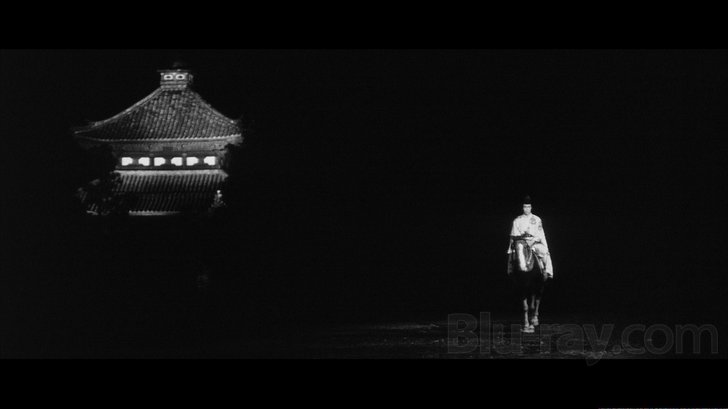
Ghosthunter
Kaneto Shindo’s Kuroneko reminded me a lot about Yasuzo Masumura’s Red Angel. Thematically, the two films have practically nothing in common but both are very atmospheric and, as strange as it may sound, despite being quite violent they are also remarkably erotic.
In Red Angel a young nurse played by the stunningly beautiful Ayako Wakao is sent to a field hospital during the Sino-Japanese war. There she assists an older and impotent doctor who is addicted to morphine. As time goes by, the two become close and eventually fall in love while people around them are dying like flies. The film is graphic and at times seriously disturbing but also incredibly beautiful and seductive.
Kuroneko is set during the Sengoku Jidai (the Warring States) period and tells the story of two women, a mother (Nobuko Otowa, The Naked Island, Onibaba) and her daughter-in-law (Kiwako Taichi, Strange Affinity, Live Today, Die Tomorrow!), who are raped by a gang of samurai. The women and their farmhouse are burned down, but their souls return as evil ghosts and swear to kill every single samurai in the land. (Don’t worry, I did not spoil the film for you).
After the ghosts begin hunting the samurai, a young warrior named Gintoku (Kichiemon Nakamura, Double Suicide, Gateway to Glory) is summoned by his master (Kei Sato, Harakiri, The Sword of Doom) and ordered to confront them. Eager to impress and earn himself a good reputation, Gintoku immediately heads to the Rajomon Gate, where he encounters one of the ghosts. Much to his surprise, the ghost turns out to be a beautiful woman who looks very much like his former wife.
Kuroneko (which translated into English means black cat) is a film of two halves. The first is gritty and unsettling, uncompromising and ugly, firmly grounded in reality. The samurai and the two women they rape belong to a world where everything makes sense – the strong prevail and the weak suffer.
The second half is drastically different. Certain sequences are still gritty, unsettling and violent, but now they drip with surreal atmosphere that changes the entire complexion of the story. For instance, when Gintoku and the ghost meet one could immediately tell that they are attracted to each other, though one does not know whether it is sexual attraction or something else that they feel. Considering the various gruesome killings that one has witnessed prior to their encounter, the sudden erotic overtones move the film into an entirely different territory.
These strange erotic overtones are what reminded me about Red Angel. They counter the ugly and horrific in a familiar fashion and shift the focus of attention elsewhere. Kuroneko and Red Angel are both horror films but also remarkably sensual and darkly seductive films.
Shindo, who is probably best known for his terrific The Naked Island and Onibaba, is a skillful director who understands and knows exactly how to create and maintain a tense and moody atmosphere. Assisted by cinematographer Kiyomi Kuroda, who also lensed the two films mentioned above, he infuses Kuroneko with a distinctive neo-gothic flavor which gradually takes over the film after the two ghosts begin hunting the samurai. The sequences from the bamboo forest for example look and feel like bizarre dreams - they are dark and slow, disturbing but beautiful, unreal yet believable.
Note: In 1969, Kuroneko won Best Actress (Nobuko Otowa) and Best Cinematography (Kiyomi Kuroda) Awards at the Mainichi Film Concours.
Kuroneko Blu-ray Movie, Video Quality 
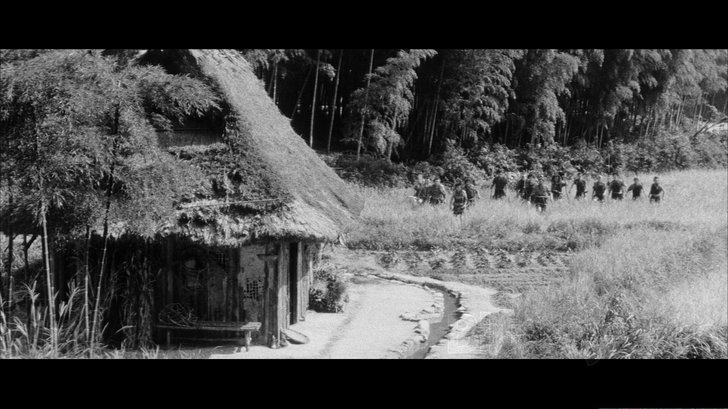
Presented in its original aspect ratio of 2.35:1, encoded with MPEG-4 AVC and granted a 1080p transfer, Kaneto Shindo's Kuroneko arrives on Blu-ray courtesy of Criterion.
The following text appears inside the booklet provided with this Blu-ray disc:
"This new high-definition digital transfer was created on a Spirit 4K from 35mm print struck from the original camera negative. Thousands of instances of dirt, debris, scratches, splices, warps, jitter, and flicker were manually removed using MTI's DRS system and Pixel Farm's PFClean system, while Digital Vision's DVNR system was used for small dirt, grain, and noise reduction.
Telecine supervisors: Lee Kline, Russell Smith.
Telecine colorist: Josh Olive/Technicolor, New York."
Kuroneko looks great on Blu-ray. Criterion's high-definition transfer boasts wonderful detail, while clarity and especially contrast levels are near perfect. The close-ups consistently convey terrific depth (see screencaptures #3 and 14) and even the darkest sequences from the bamboo forest look vibrant and well detailed. (I don't have Kuroneko on DVD to compare it to the Blu-ray, but I would be shocked if the DVD isn't plagued by various macroblocking patterns; with all of these beautiful nighttime sequences, this is the perfect film to avoid on DVD and see on Blu-ray). The color-scheme is also impressive. The blacks are rich and well saturated but not boosted, while the grays and gentle whites perfectly compliment each other (see screencapture #5). There are no traces of post-production sharpening. I also did not see any signs of excessive filtering. On the contrary, there is well resolved grain present throughout the entire film. Finally, there are a few scenes where I noticed some extremely mild shimmer around the edges, but there are no serious stability issues or damage marks to report in this review. (Note: This is a Region-A "locked" Blu-ray disc. Therefore, you must have a native Region-A or Region-Free PS3 or SA in order to access its content).
Kuroneko Blu-ray Movie, Audio Quality 
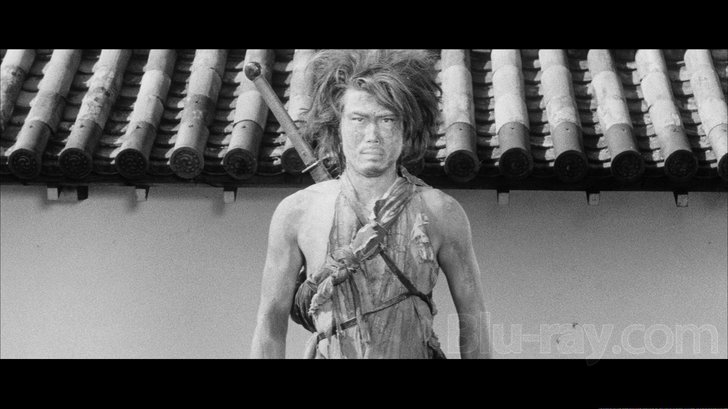
There is only one audio track on this Blu-ray disc: Japanese LPCM 1.0. For the record, Criterion have provided optional English subtitles for the main feature. When turned on, they appear inside the image frame.
The following text appears inside the booklet provided with this Blu-ray disc:
"The original monaural soundtrack was remastered at 24-bit from the original optical print. Clicks, thumps, hiss, and hum were manually removed using Pro Tools HD. Crackle was attenuated using AudioCube's integrated workstation."
Understandably, the Japanese LPCM 1.0 track has a limited dynamic amplitude, but Hikaru Hayashi's minimalistic score and the various ambient sounds that enhance the film's moody atmosphere have benefited greatly from the loseless treatment. Specifically, the music and audio effects are well rounded and more importantly well integrated into the film, never lacking identity or feeling out of place. The dialog is crisp, clean, stable, and easy to follow. The English translation is very good.
Kuroneko Blu-ray Movie, Special Features and Extras 
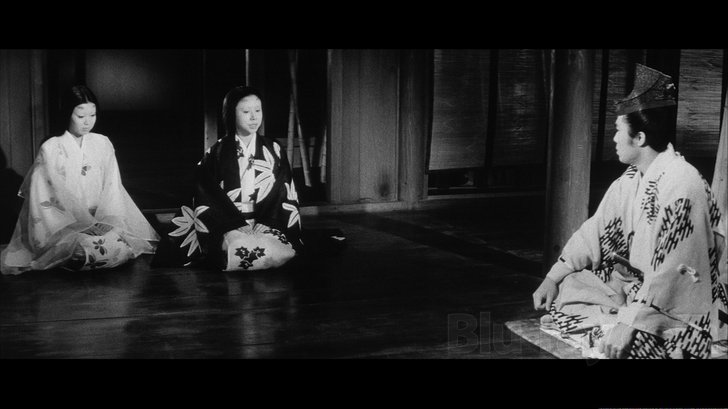
- Trailer - original trailer for Kuroneko. In Japanese, with optional English subtitles. (3 min, 1080p).
- Kaneto Sindo - in this long and very informative video interview, director Kaneto Shindo discusses his films, his introduction to the film business, the various directors and professionals that influenced him during the years, etc. The interview was conducted by assistant director Seijiro Koyama for the Directors Guild of Japan on April 24, 1988. In Japanese, with optional English subtitles. (61 min, 1080i).
- Tadao Sato - in this video interview, Japanese cinema critic Tadao Sato discusses Kuroneko and its cultural significance. The interview was conducted exclusively for Criterion in 2011. In Japanese, with optional English subtitles. (17 min, 1080i).
- Booklet - 30-page illustrated booklet featuring Maitland McDonagh's essay "The Mark of the Cat" (the author has written about film for publications ranging from Dance Now to the New York Times and Film Comment) and an excerpt from a 1972 interview that film scholar Joan Mellen conducted with director Kaneto Shindo (the interview originally appeared in the 1975 book Voices from the Japanese Cinema).
Kuroneko Blu-ray Movie, Overall Score and Recommendation 
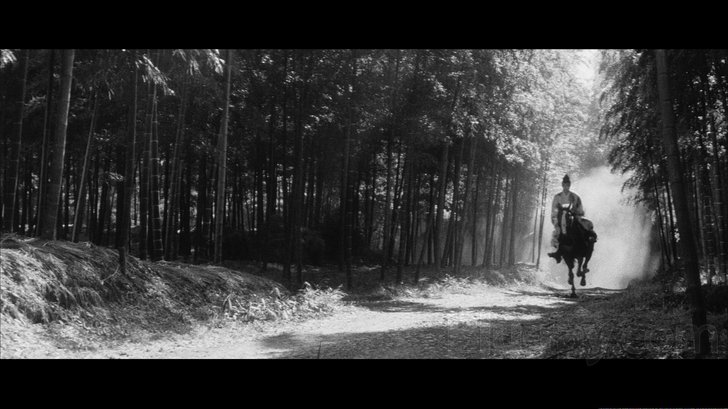
Kaneto Shindo's Kuroneko is an enormously atmospheric, deeply poetic and surprisingly seductive horror film. While not as refined and well polished as the Japanese director's acclaimed Onibaba, Kuroneko is nevertheless a genially entertaining film that should appeal to a wide variety of viewers. As expected, the folks at Criterion have made sure that the film looks as good as it can on Blu-ray. HIGHLY RECOMMENDED.
Similar titles
Similar titles you might also like

Onibaba
鬼婆
1964

Kwaidan
怪談 | Kaidan | Original Cut
1965

Harakiri
切腹 / Seppuku
1962

Sansho the Bailiff
山椒大夫 / Sanshō dayū
1954

Throne of Blood
蜘蛛巣城 / Kumonosu-jō
1957

The Phantom Carriage
Körkarlen
1921

An Actor's Revenge
雪之丞変化 / Yukinojō henge
1963

Rigor Mortis
殭屍
2013

The Life of Oharu
西鶴一代女 / Saikaku ichidai onna
1952

Cemetery of Splendor
2015

Three Outlaw Samurai
三匹の侍 / Sanbiki no samurai
1964

Floating Weeds
浮草
1959

House
ハウス / Hausu
1977

Horse Money
Cavalo Dinheiro
2014

La Notte
1961

Hara-Kiri: Death of a Samurai
一命 / Ichimei
2011

Dark Water
Honogurai mizu no soko kara
2002

Evil of Dracula
Chi o suu bara
1974

In a Glass Cage
Tras el cristal
1986

Tokyo Story
東京物語 / Tōkyō monogatari
1953